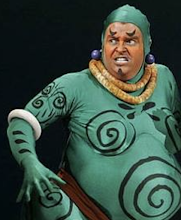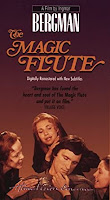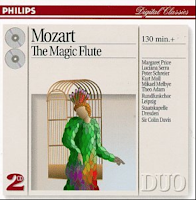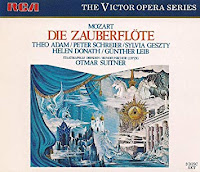Monday, July 19, 2021
Picture Book: "Mozart's The Magic Flute," written by Mi-ok Lee, illustrated by Edmée Cannard
Sunday, July 18, 2021
The Problem of Monostatos's Race

What to do about Monostatos in modern productions of The Magic Flute?
Wednesday, June 30, 2021
Analyzing "The Magic Flute": Joachim Kaiser, "Who's Who in Mozart's Operas"
Of all the scholarly books on opera that I've found over the years, Joachim Kaiser's 1984 Who's Who In Mozart's Operas: from Alfonso to Zerlina is by far one of the most interesting. It's a mini encyclopedia of every character from all of Mozart's major operas, featuring descriptions and analyses of every single character: small ones for the minor characters, longer and deeper discussions for the major characters. While other books I've read have offered character analysis within their discussions of the operas as a whole, or else have been devoted to a specific subset of characters, no other book has been as exclusively devoted to character analysis, or as willing to examine even the most minor characters.
Friday, March 5, 2021
Picture Book: "The Magic Flute," written and illustrated by Kyra Teis
The Magic Flute is widely regarded as one of the best introductions to the world of opera for children. (Having been a child introduced to opera by The Magic Flute, I wholeheartedly support that belief.) So it's no surprise that an array of picture book adaptations have been published to introduce children to the story. Over time I've collected as many of those picture books as I've been able to find. But the one that seems to be the most widely available nowadays is this 2008 edition, written and illustrated by Kyra Teis. Throughout the last ten years I've repeatedly found it in the children's corners of music venues' gift shops and in bookstores with shelves devoted to introducing children to classical music.
Film Review: "Trollflöjten," ("The Magic Flute"), Sveriges Radio/Janus Films, 1975 (conducted by Eric Ericson)
Trollflöjten (The Magic Flute)
1975, Sveriges Radio/Janus Films
Sound Recording Review: Die Zauberflöte," Deutsche Grammophon, 1964 (conducted by Karl Böhm)
Die Zauberflöte
1964, Deutsche Grammophon
Sunday, February 28, 2021
"The Magic Flute" and Irreverent Modern Humor
I can't help but notice a trend in recent productions of The Magic Flute. Or at least in American productions marketed chiefly for families and newcomers to opera. That trend is to infuse the dialogue with a distinctly irreverent sense of humor. Modern references, pop culture references, cracks in the fourth wall, and generally cheeky jokes that are nowhere to be found in the original libretto. Even in otherwise "traditional" productions, these touches can be found. Usually they involve Papageno, but sometimes other characters too.
Here are some examples from productions I've either seen onstage myself or read about:
Friday, February 26, 2021
Video Recording Review: Die Zauberflöte," Royal Opera House, Covent Garden, 2003 (conducted by Colin Davis)
Wednesday, February 24, 2021
Sound Recording Review: "Die Zauberflöte," Deutsche Grammophon, 1955 (conducted by Ferenc Fricsay)
"The Magic Flute" Personality Types (MBTI)
Ever since I discovered Myers-Briggs Type Indicator, it’s been an invaluable tool for understanding
myself and for understanding others around me. It’s also been a fantastic tool for analyzing fictional
characters. While I understand that no scholarly character analysis would use this personality-typing
system, especially for a work of fiction created centuries earlier, examining a character’s MBTI type
can provide insights into that character you might never have otherwise considered.
Video Recording Review: "Die Zauberflöte," Salzburg Festival, 1982 (conducted by James Levine)
Die Zauberflöte
1982, Salzburg Festival
(Reviewer's note: I in no way support or condone the personal-life actions of James Levine. This is an objective review of an artistic performance.)
Tuesday, February 23, 2021
Sound Recording Review: "Die Zauberflöte," Philips, 1984 (conducted by Colin Davis)
1984, Philips
Video Recording Review: "Die Zauberflöte," Drottningholm Court Theatre, 1989 (conducted by Arnold Östman)




Die Zauberflöte
1989, Drottningholm Court Theatre
Analyzing "The Magic Flute": M. Owen Lee, "The Operagoer's Guide"
This is the first of what I hope will be many posts discussing the analyses of The Magic Flute found in books about opera. In these posts, I plan to outline each analysis itself, and then share my response to it and whether I like and agree with it or not.
Monday, February 22, 2021
David Hockney's "Magic Flute" costume sketches
Sound Recording Review: "Die Zauberflöte," RCA Victor, 1970 (conducted by Otmar Suitner)
Die Zauberflöte
1970, RCA Victor
Sound Recording Review: "Die Zauberflöte, Decca, 1991 (conducted by Sir Georg Solti)
Die Zauberflöte
Video Recording Review: "Die Zauberflöte," Glyndebourne Festival Opera, 1978 (conducted by Bernard Haitink)
Sound Recording Review: "Die Zauberflöte," EMI, 1964 (conducted by Otto Klemperer)
Die Zauberflöte
1964, EMI












































